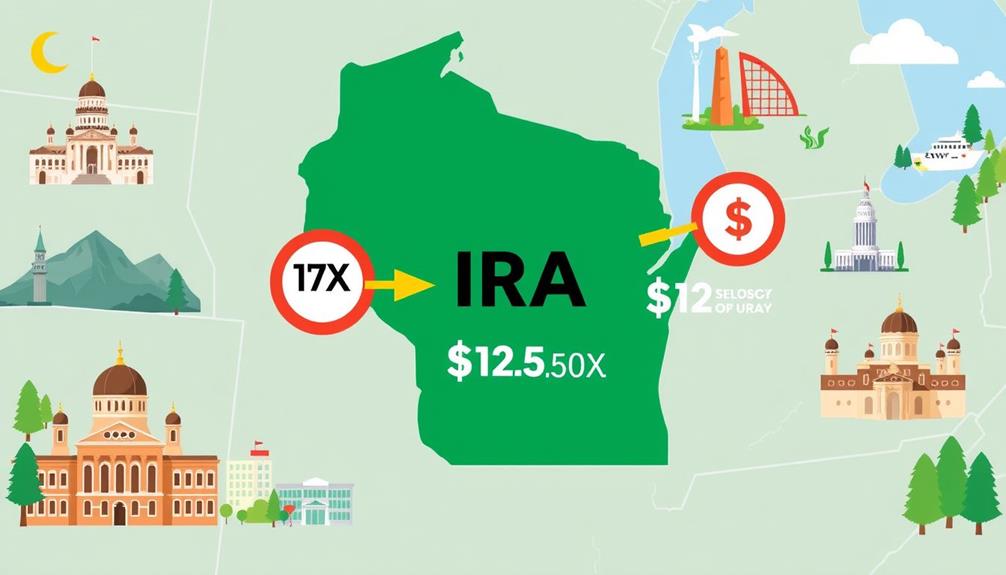When taking money out of a traditional IRA in Wisconsin, you will be subject to state income taxes that range from 3.50% to 7.65%. All withdrawals are considered ordinary income, so they must be reported on your state tax return using Form 1099-R. Individuals who are 65 years old or older can deduct up to $5,000 from their taxable retirement income. It is important to note that withdrawing funds early, prior to reaching 59 and a half years old, may result in federal penalties in addition to state taxes. Understanding these consequences is crucial for effective retirement planning, and there is much to learn about optimizing your tax strategy in this scenario.
Key Takeaways
- Traditional IRA withdrawals in Wisconsin are fully taxable as ordinary income, with state tax rates ranging from 3.50% to 7.65%.
- Individuals aged 65 or older can deduct up to $5,000 from their taxable retirement income.
- Early withdrawals before age 59½ incur a 10% federal penalty plus applicable state taxes, but exceptions may apply.
- Full-year residents are subject to state taxes on IRA withdrawals, while nonresidents are generally exempt.
- Wisconsin offers additional tax benefits for seniors, including a personal exemption and increased standard deduction.
Overview of IRA Withdrawals in Wisconsin

When you consider IRA withdrawals in Wisconsin, it's essential to understand how they're taxed. In Wisconsin, all distributions from traditional IRAs are fully taxable as ordinary income, impacting your state income tax. Depending on your total income level, state income tax rates for IRA withdrawals range from 3.50% to 7.65%.
You'll need to report these withdrawals on your state income tax returns, and your financial institution will provide you with a Form 1099-R detailing the amount withdrawn. It's also important to keep in mind the potential benefits of creating a personal budget to manage your retirement income effectively.
If you're 65 or older, you can deduct up to $5,000 from your taxable retirement income, which includes IRA withdrawals, provided you meet certain income thresholds.
However, if you're considering early withdrawals—before age 59½—be aware that these may incur a 10% federal penalty in addition to state taxes, although exceptions exist for situations like disability or other specific hardships.
Understanding these tax implications is significant for effective retirement planning. By knowing how your IRA withdrawals will be taxed, you can make more informed decisions that align with your financial goals in retirement.
State Tax Rates on Withdrawals

Understanding the state tax rates on IRA withdrawals is essential for planning your retirement income. In Wisconsin, withdrawals from retirement accounts, including traditional IRAs, are subject to state income taxes ranging from 3.50% to 7.65%, depending on your total adjusted gross income.
Unlike Social Security benefits, which are exempt from state tax, IRA distributions are fully taxable and contribute to your overall taxable income. Additionally, considering the advantages of Gold IRAs can provide a strategic way to diversify your retirement portfolio and potentially mitigate tax liabilities.
It's crucial to recognize that the state doesn't offer any special exemptions for these withdrawals, meaning all IRA distributions will impact your state tax liability. If you're age 65 and older, you may qualify for a retirement income exclusion, allowing you to deduct up to $5,000 from your taxable income, which can help reduce your Wisconsin income tax burden.
When planning your withdrawals, consider how your IRA distributions will affect your state tax rates. Understanding these elements can help you strategize your retirement income more effectively, ensuring you minimize your tax obligations while maximizing your financial resources in retirement.
Be sure to account for the specific implications of Roth IRA withdrawals, as they may vary based on contribution types and timing.
Impact of Residency on Taxation

How does your residency status influence the taxation of IRA withdrawals? In Wisconsin, if you're a full-year resident, you'll face state taxes on your IRA withdrawals, with rates ranging from 3.50% to 7.65%, depending on your total income.
Nonresidents, however, are generally exempt from state taxes on these withdrawals, making your residency status critical in determining your tax liabilities. Additionally, it's important to reflect on how various investment options, such as a Gold IRA, can impact your overall retirement strategy and tax implications, especially given the potential for precious metals to provide a hedge against inflation and market volatility.
For those interested, Noble Gold offers a range of precious metal investment options.
For part-year residents, the taxation on IRA withdrawals applies only to the portion of the year you resided in Wisconsin. During nonresident periods, you won't owe state taxes.
If you're age 65 and older, you can benefit from a deduction of up to $5,000 from your taxable income, which may include deductions from your IRA withdrawals if you qualify based on income criteria.
Keep in mind that military retirement benefits are exempt from Wisconsin state tax, but this exemption doesn't extend to other retirement accounts like IRAs for residents not in military service.
Understanding your residency status is essential for maneuvering the complexities of state taxes on IRA withdrawals in Wisconsin.
Tax Benefits for Seniors

For seniors in Wisconsin, there are several tax benefits that can considerably ease financial burdens during retirement. One significant advantage is the personal exemption, which allows you to reduce your taxable income by $700 if you're 65 or older.
If both you and your spouse meet this age requirement, you can claim an additional $250 exemption.
Wisconsin also offers a retirement income exclusion, enabling eligible seniors to deduct up to $5,000 from retirement income taxable if you meet specific income thresholds. The standard deduction increases for seniors, further lowering your personal income tax liability.
In terms of property taxes, various credits like the Homestead credit enhance financial relief, especially for low-income seniors.
Additionally, you can subtract medical care insurance premiums from your taxable income, which can provide essential tax benefits for healthcare costs.
Comparison With Neighboring States

When comparing state tax implications for IRA withdrawals, Wisconsin's approach stands out among its neighbors. Wisconsin taxes these withdrawals at state income tax rates ranging from 3.50% to 7.65%, which can be burdensome for retirees.
In contrast, Illinois imposes a flat rate of 4.95% on IRA distributions, making it slightly more predictable for those planning their finances.
Minnesota also taxes IRA withdrawals similarly to Wisconsin, with a progressive income tax on retirement income that can reach up to 9.85%. This rate can be intimidating for retirees looking to maximize their income.
However, Iowa offers a recent exemption for retirement income for individuals aged 55 and older, which could considerably lower tax liabilities compared to Wisconsin's consistent taxation.
Moreover, Michigan stands out by not taxing IRA withdrawals for individuals aged 67 and older, making it a more attractive option for retirees.
While all neighboring states, including Illinois and Minnesota, tax IRA withdrawals, Iowa and Michigan's exemptions potentially benefit retirees more than Wisconsin's tax model does.
Frequently Asked Questions
Does Wisconsin Tax IRA Withdrawals?
Yes, Wisconsin taxes IRA withdrawals. You'll pay state income tax rates that depend on your total income, and traditional IRA withdrawals are fully taxable, unlike some other retirement income sources. Plan accordingly to minimize taxes.
Do You Pay State Income Tax on IRA Withdrawals?
Oh, you thought IRA withdrawals were tax-free? Surprise! You'll pay state income tax on those funds, which can range from 3.50% to 7.65%. So, brace yourself for that delightful bill when you withdraw!
What Is the Tax Break for Seniors in Wisconsin?
In Wisconsin, you can subtract up to $5,000 from your retirement income if you're 65 or older. You also qualify for a higher standard deduction and personal exemptions, boosting your overall tax savings considerably.
Is the Wisconsin Retirement System Taxed?
Yes, the Wisconsin Retirement System is taxed. Your pre-tax contributions are taxable, while post-tax ones aren't. If you're 65 or older, you might qualify for a retirement income exclusion, reducing your taxable income.
Conclusion
Maneuvering the state tax implications of IRA withdrawals in Wisconsin can feel like sailing through uncharted waters. Just as a skilled captain adjusts their sails to catch the right winds, you can steer your financial course by understanding local tax rates and benefits. Keep an eye on the horizon for residency impacts and neighboring states' rules, and you'll find smooth sailing ahead. With the right knowledge, you can chart a course that leads to a secure financial future.









